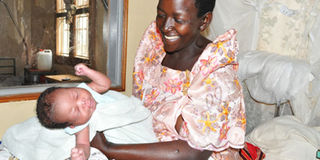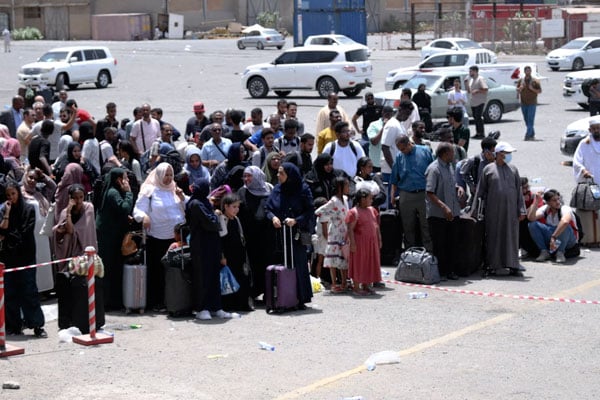The midnight call that saved mum from neglect during child delivery

Ms Restie Naddamba carries her baby at Nkozi Hospital. PHOTO BY RACHEL MABAKA
What you need to know:
Child birth is a painful experience according to mothers, but being neglected during that critical moment of bringing life into the world, can even be more tormenting. Our Investigations Editor Chris Obore narrates one mother’s ordeal.
‘12:55am. It was Monday, June 17. I was just starting to sleep when my phone rang. It’s not unusual because several “stubborn” relatives and other people occasionally call me at awkward hours. My wife always takes issue with me leaving my phone on at night - it disrupts her sleep.
I got out of bed to pick up the phone from where I had left it charging so that I could switch it off. I murmured my anger at the caller partly to show my wife that I was equally disturbed.
Instead of switching off the phone, I pressed the ‘yes’ button but the caller went off the line. As I walked back to bed, the phone rang again but went off immediately. Disappointed, I called back but the number was busy.
Problem at hand
I had nearly given up on the call when the phone rang again. I picked it up. “Is this Chris Obore of KFM [radio]?” the caller asked.
Still half-asleep, I responded in the affirmative. The caller, without introducing himself, said: “There is a problem here, you call me back.”
When I called him back, he immediately went on to explain what the problem was. “There is a woman in Buwama in Mpigi District who is delivering twins but she is about to die because the nurses have abandoned her,” he explained.
He added: “She was brought from Bunjako Health Centre III after delivering one baby. They [nurses] told her the second one had failed to come out and they referred her here. She has an attendant but they are stranded in the compound.”
I asked whether I could speak to a nurse at the health unit but the caller says: “They are not here. They have locked themselves in a room.”
After that brief narrative, the line was cut off but I called back.
He continued to explain: “The woman is bleeding. She crawled out of the Maternity Ward but collapsed in the compound. She wanted to go to the main road and get transport to Nkozi Hospital [about 18kms away] where the nurses had referred her.”
I asked whether there was a police station nearby and the caller said: “Yes, the attendant told me that one nurse went to ask for an ambulance from Buwama Police Station [about 100 meters away] but she was told there is no fuel in the ambulance.”
He added: “The nurse came back and asked the patient for money to buy fuel and she didn’t have money. The nurse told them to go away.”
I told the caller to stay with the mother as I make some calls for help.
By that time, I was fully awake. My wife was woken up by my conversation with the strange caller and she sat alert on the bed. “What are you going to do? Are you going to drive there?” she asked.
I told her I would call some people who can help and she responded: “ I wish they could save her or at least the baby.”
I called some officials in the Ministry of Health, including Permanent Secretary Asuman Lukwago but their phones were not available.
I made several calls elsewhere until I ran out of airtime. I was frustrated and wondered how to help the woman. It was way past 1am.
I remembered I still had air time in my other sim card, so I dialed Felix Kaweesi’s number. Mr Kaweesi is the Police Commander for Kampala Metropolitan. When he cancelled my call, I became even more desperate but he called me back in a few minutes. I narrated to him the problem and he said: “We have a police ambulance in Buwama.”
I, however, told him: “I’m told they have refused to respond.”
“Let me instruct them. Let me call the District Police Commander,” he said.
Mr Kaweesi was true to his word. He called me back shortly after and told me he had instructed the DPC to ensure that the mother is transported to Nkozi Hospital.
I told my informer about the development and asked him to proceed to the police station and wait for the ambulance. When my contact arrived at Buwama Police Station, he found police officers complaining about how Mr Kaweesi had learnt of the incident.
Police intervention
When I called him, he left his phone on so that I could listen to what the police offices were saying. I overheard the police officers arguing and wondering who had alerted Mr Kaweesi.
I then informed Mr Kaweesi of a possible delay again as his officers were still embroiled in arguing about how he learnt of it. “Don’t worry, they have to take her to Nkozi [Hospital]. We will deal with the nurses later,” Mr Kaweesi said.
Shortly after, my contact informed me that the police ambulance was on the way to the health centre to pick the mother, Resty Naddamba and her attendant Christine Nassanga, to take them to Nkozi Hospital.
Ms Naddamba was still unconscious, according to my contact, who also agreed to travel to Nkozi with the mother and the attendant.
The police asked one of the nurses to accompany the patient to the hospital but they reportedly declined. At Nkozi Hospital, my contact, who requested not to be named for fear of being victimised, told me the mother had arrived at the hospital.
It was 2am. “They say she needs blood but there is no blood. They have put her on drip,” he told me. I had to be up by 5am and prepare for a radio programme which starts at 7am, so I went back into bed.
At 6am, I called my contact to inform him that I would be visiting Nkozi Hospital to check on Ms Naddamba. Later in the day, I posted the events of the night on the social networking site - Facebook and briefed my senior editors - Charles Odoobo Bichachi and Don Wanyama about it. Moved by the story, they told me to make a follow up.
Another tragedy
I hit the road to Nkozi Hospital [about 65km] from Kampala, with my photographer Rachel Mabala. We picked up my contact at Buwama. But about 18kms to Nkozi Hospital, we witnessed a fatal accident. A milk tanker collided with an oncoming Toyota Landcruiser car, killing two of its occupants -Joseph Muwonge [the driver] and George Hutchinson, on the spot. The third passenger, Steven Bradford from Virginia, US, was still alive.
We stopped to do some journalism. Villagers gathered around the accident scene to try to save Mr Bradford but had no equipment to speed up his rescue from the car wreckage.
I called the police officials to alert them about the accident and the need to rescue Mr Bradford. My calls went unanswered until 30 minutes later when an aide of Inspector General of Police Kale Kayihura answered my call.
He promised to reach the police in the area. Soon after, a military convoy approached and I waved them down. It was the convoy of Gen. Elly Tumwine [an army representative in Parliament].
I told him about the nasty accident upon which he ordered his escorts to secure the area while some joined the civilians to pull out Mr Bradford from the wreckage.
He was still alive, half conscious but gasping for breath.
“Don’t mind, you will be fine,” Gen Tumwine consoled him as we carried him onto the back of the escort pick-up truck.
Later, traffic police officers arrived at the scene. We go into our car and followed Gen. Tumwine - who carried Mr Bradford in his car - to Nkozi Hospital.
Shortly on arrival at Nkozi Hospital, Mr Bradford was declared dead. The police ambulance from Buwuma Police Station [about 4km] from the accident scene, arrived at Nkozi Hospital when the news of Bradford’s death had just been delivered to us.
I and my colleague Rachel asked ourselves so many questions. We told ourselves that Bradford should never have died had he received help earlier.
Seeing that our effort to save Bradford was fruitless, we resumed our mission to check on Ms Naddamba. We found her on a bed at the corner of the Maternity Ward. She was with her bundle of joy - a handsome baby boy. The attendant had gone back to Bunjako Island to look for food. After some pleasantries, she narrated to us her ordeal.
Naddamba tells her story
I delivered one child at Bunjako Health Centre at around 6pm on June 17 but the nurse told me the second one had remained in my womb.
She sent me to Buwama Health Centre. We left Bunjako at around 7pm on a motorcycle and arrived at Buwama at 9pm. I was in pain.
The nurse checked me and asked if I had money. I told her no. She told me to go Nkozi [Hospital] because Buwama is also a Grade III hospital like Bunjako where I had come from. They [nurses] left me and entered their room. We remained there. I told Nassanga [my attendant] to take me to the main road to board a vehicle to Nkozi.
I could no longer stand, so I crawled. We met some man who asked whether I had seen the doctor and I told him that we had seen the nurses but they had not helped me. They said if you don’t have money, you suffer.
I was bleeding a lot and I don’t remember what happened next.
Ms Nassanga told me that I was brought to Nkozi Hospital half dead by police officers. I was told there were four officers in the car. I thank Afande who picked me.”
We checked on her medical form and her condition is described as fair. The baby boy weighed 3.8kgs. Ms Sophie Nantongo, the midwife tells us that Ms Naddamba, 38, needed blood because she had lost a lot but the hospital didn’t have any.
“She was brought here unconscious. She had a retained placenta but we managed the situation. We have sent for blood from Masaka Referral Hospital,” Ms Nantongo said. A little financial help from us and senior photo journalist -James Akena - who was touched by her situation, put a smile on the face of Ms Naddamba.
She is a mother of four other children. Her husband, Semakula Wasswa had stayed at home looking after the other children and had no clue about the ordeal his wife had gone through.
Joy at last
When we gave Ms Naddamba the little money we had, we were shocked by the clapping of other mothers and attendants in the Maternity Ward who kept saying: “God bless you, God bless you.” Apparently, they were worried about Ms Naddamba who had been left in the hospital alone without money as her attendant went to look for food for her.
It was time to leave and we passed by Buwama Police Station to inquire why the response to save a mother giving birth was sluggish. They did not want to answer any questions from us. However, Mr John Bilimuturembwa, the OC CID, said: “We are holding the nurse who was on duty that night.”
According to a recent report by Save the Children, Uganda is one of the toughest countries for mothers. Naddamba was saved but 16 other mothers died that same day of July 17 during child birth, according to records on maternal mortality in the country.




